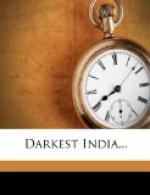The returns for the past year show that the prison gates have been visited 235 times, for the purpose of meeting the convicts on their release. Since the commencement of the Home about 134 men have been admitted. Of these 74 have professed conversion, about 12 having been accepted as officers by ourselves and the remainder having mostly found employment elsewhere. The number of meals given during the past year has been about 7,800.
One of the special features of the work here consists in the constant visitation of the liquor dens, with a view to persuading those who were frequenting them to give up their evil ways. No less than 430 such were in this way visited and a large number of papers distributed. While the opposition was in some instances severe, as a rule our officers were well treated even by the grogshop-keepers, who while admitting that their trade was evil, pleaded that they had the Government’s approval, and that they must somehow support themselves and their families.
Besides the regular inmates, a large number of casuals have been relieved and assisted, but of these we have no exact figures.
The following are some specimens of the work done by us among the criminal classes in Bombay and Ceylon:—
LIEUTENANT HIRA SINGH
Is a Hindu of the Kshatraya caste. He comes of a soldier race and family, his father having served in the East India Company’s army before him, and he having from his youth followed the same profession for the past eighteen years, serving successively as Private, Lance-Corporal, Corporal, and Sergeant in a native Regiment. He went through the last Afghan campaign, having been to Cabul, Quetta, and other places.
For many years his conduct was excellent, but latterly he took to drinking, got into serious trouble with the police, and was sent to prison for forty days, thus losing his post as well as his claim to pension. He was met by our officers on his release, accompanied them to the Home, gave his heart to God, and has now been an officer in our ranks for more than a year. During most of this time he has been connected with our Bombay Prison Gate work, and has in turn helped to rescue many others. But for the help he then received, a life of drunkenness and crime would probably have been, almost forced upon him. He is a good specimen of numbers who would like to reform, but with ruined reputation have no choice, save between starvation and crime.
HARMANIS.
“I am a native (Singhalese) of Kalutara in Ceylon. My father was a toddy-drawer. We were very poor. Sometimes my uncles would give me a cent or two for mounting guard to give them warning about anybody’s approach while they were slaughtering stolen cattle in the jungles. Once, being very hungry, I climbed up a palm tree to steal cocoanuts, but was caught by the owner and handed over to the police. The magistrate sent me to jail for three weeks. After my release I came to Colombo, and falling in with the Salvation Army, I went to their Home for prisoners, and now thank God I am saved.”




